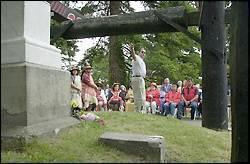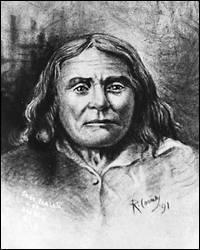 |
KEVIN GERMAN / THE SEATTLE TIMES

|
| Suquamish tribal Chairman Bennie Armstrong points back to the headstone of Chief Seattle during a rededication ceremony yesterday. The Old Chief's headstone, desecrated in May, has been repaired and polished. |
SUQUAMISH, Kitsap County — The dead are not powerless.
Chief Seattle believed it and told white government officials so when he and 80 other Indian leaders ceded Puget Sound to the United States in the 1855 Treaty of Point Elliott.
Suquamish and Duwamish descendants of the man affectionately called the Old Chief believe it today. That's why they — along with representatives from other Washington tribes and a number of non-Natives, including several elected officials — gathered yesterday at the chief's grave.
In May, vandals toppled the marble cross from atop the monument that marks the chief's final resting place on the Port Madison Indian Reservation, northwest of Bainbridge Island.
The cross was broken in three.
There have been no arrests, but the FBI case is still open into what many believe was a hate crime. A possible motive is opposition to a low-income housing project the Suquamish Tribe wants to build; an article from a local newspaper about the continuing dispute was left on top of the grave.
Yesterday, more than 100 people paid their respects in a rededication ceremony meant to appease Seattle's spirit and the spirits of his ancestors injured by the desecration.
Chief Seattle, who died in 1866, was the leader of the Suquamish, Duwamish and other allied tribes who greeted the city's founders 150 years ago. The settlers showed their gratitude by naming their frontier town after the chief. "A friend to the whites" is engraved on his headstone.
 |
MSCUA, University of Washington Libraries, NA1515

|
| Chief Seattle |
"When there's a desecration, there's a disturbance," said Al Scott Johnnie, cultural director for the Lummi Tribe, who was invited to emcee the event. "This is healing for our people."
Rick and Michelle Lanning, a Kingston, Kitsap County, couple, donated materials and labor to repair the cross. Steel rods were drilled into the white, Italian marble and the pieces glued together with epoxy. The stone, oxidized over the years to a dull gray, was polished and cleaned.
Owners of Sound Stoneworks, the Lannings — she's a Suquamish tribal member, he's a non-Native builder — say the tension in the community over the housing project is palpable.
Though the rededication ceremony was a means to "begin the healing," Indian people face racism daily in Suquamish, on Bainbridge Island and "on the other side of the water," said Bennie Armstrong, the Suquamish tribal chairman.
"The fractures in this cross have been repaired but I don't know what we can do to fix the fractures in this community," he told the assemblage, which included many elders who wore cedar hats and wrapped blankets around their shoulders against the cool of the overcast day.
Chief Seattle knew white settlement here was inevitable, Armstrong said.
"He knew we'd have to share our culture, knew we weren't going to be able to say, `Go away.' It's the practice of tolerance we need between our cultures now," he said.
 |
KEVIN GERMAN / THE SEATTLE TIMES

|
| Suquamish tribal member Bob George recites one of Chief Seattle's speeches near his grave at the ceremony attended by more than 100 people yesterday on the Port Madison Indian Reservation. |
J.I. James agreed. His great-grandfather was Chief Seattle's nephew, and James — along with a younger cousin — now carries the name Sea-alth.
"It's not just his grave they were desecrating, but his ideal," said James, who is tribal liaison to King County Executive Ron Sims.
"He protected his people by working with the whites. In one of his speeches, he said the dead are not powerless and he has the power to bring people here today."
After the rededication, salmon baked over alder embers was served at the Suquamish tribal community center. Representatives from the Swinomish, Lummi, Duwamish, Makah, Tlingit, Puyallup, Suquamish and Tulalip tribes were called forward as witnesses.
In keeping with oral tradition, it is now their responsibility to pass down all they saw and heard so future generations will know how the people tried to right the wrong done to their Old Chief.
Sara Jean Green can be reached at 206-515-5654 or sgreen@seattletimes.com.
|
 Sunday, July 15, 2001 - 12:00 a.m. Pacific
Sunday, July 15, 2001 - 12:00 a.m. Pacific

